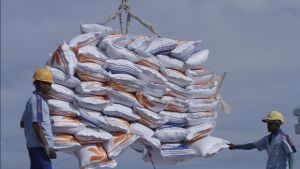JAKARTA - The use of local salt for industrial needs, especially food and beverage factories (mamin) did not run smoothly.
This is because the production is not in accordance with what is expected and is labeled as a product of defects or rejects.
The Association of Indonesian Beverage Food Producers (Gapmmi) reports that the quality of local salt is still inadequate and cannot match the specifications of industrial salt.
General Chairperson of Gapmmi Adhi S Lukman said, there are already four large spice factories in Indonesia that complain about the quality of local salt.
He hopes that the government will intervene to overcome this problem.
The government has set a target to stop importing consumption salt from 2025 and industrial salt by 2027.
"What is clear is that there are four companies that reported to Gapmmi, (they) are the largest salt users who reported that there were (products) that were rejected and so on," said Adhi when met by reporters at the Ministry of Industry office, Jakarta, Wednesday, January 15.
Adhi did not mention the names of the four factories. He only said that some industry players could not use local salt raw materials to produce food or spices.
"The impact (using local salt) is that the products are damaged, the quality is down and the results are high, high," he said.
Adhi said that the food variety industry had tried to use local salt for the production process. Unfortunately, some have become failed products and are rejected by consumers.
There are several reasons for the product to be a reject item. Among other things, the final product of makin, such as spices, so it clots, experiences contamination to the level of NaCl that does not meet the requirements.
"Several surveyors have been witnessed, there are contamination of black spots and so on, which of course are not allowed in food," he said.
In addition to inadequate quality, said Adhi, the supply of local salt is not sufficient to meet production needs throughout the food and beverage industry.
For example, he continued, the four food and beverage companies each need salt to produce around 70,000-80,000 tons a year.
Meanwhile, the Ministry of Industry noted that the domestic salt production capability was only at 2.4 million tons.
SEE ALSO:
Meanwhile, the overall demand for salt is almost 4.9 million tons.
For the food and beverage industry itself, according to Adhi, the supply of local salt can reach 600,000 tons.
However, the problem with the quality of local salt makes the absorption minimal, only half.
"My estimate is that I really can't use it from within the country, maybe around 300,000 tons, yes," he said.
The English, Chinese, Japanese, Arabic, and French versions are automatically generated by the AI. So there may still be inaccuracies in translating, please always see Indonesian as our main language. (system supported by DigitalSiber.id)











